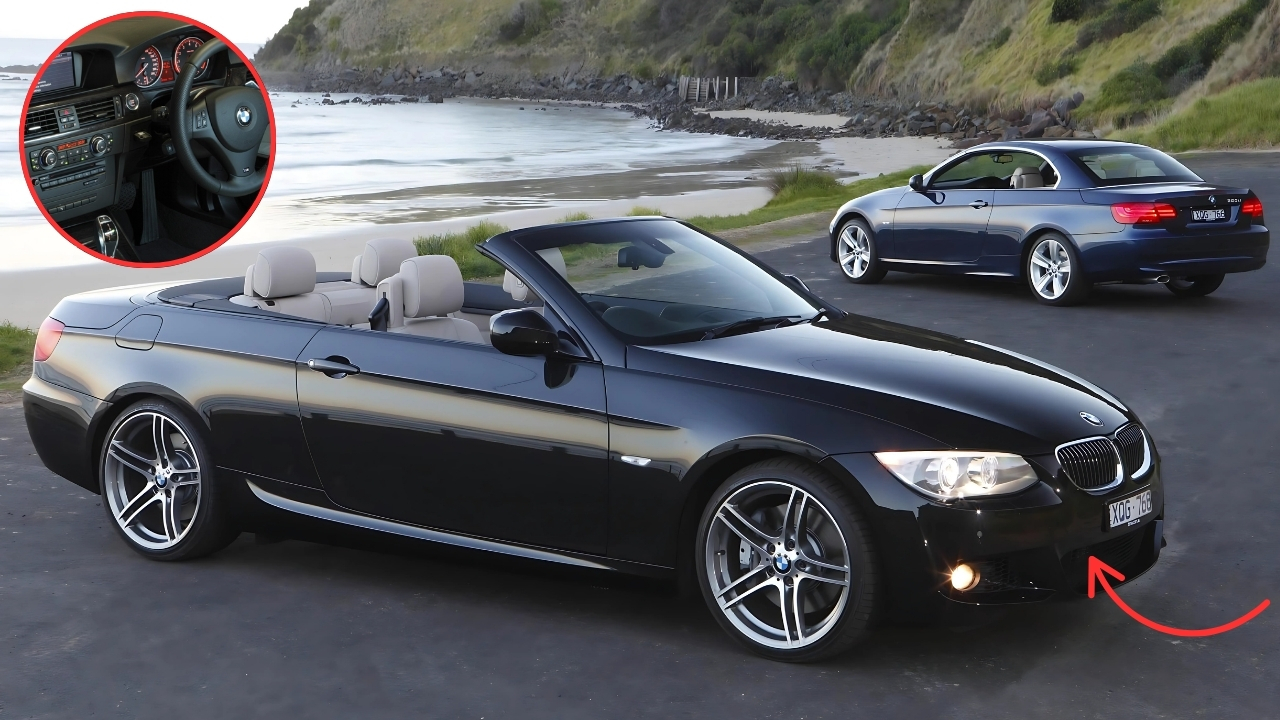BMW 3 Series : The automotive world has been rocked once again by another chapter in the ongoing Takata airbag crisis, this time targeting hundreds of thousands of BMW 3 Series vehicles.
In a development that has sent shockwaves through the automotive community, BMW has issued an urgent recall affecting nearly 400,000 vehicles across multiple model years, highlighting a particularly troubling aspect of the infamous Takata airbag scandal that continues to plague the industry.
This latest recall represents a unique twist in the long-running Takata saga, as it primarily concerns aftermarket modifications that vehicle owners may have unknowingly made to their cars.
Unlike previous recalls that targeted factory-installed components, this situation involves unauthorized steering wheel replacements that could have introduced deadly airbag inflators into vehicles that were originally safe.
Understanding the Scope of the Current Crisis
The magnitude of this recall cannot be understated. BMW has identified approximately 394,029 vehicles that potentially harbor these dangerous airbag systems, making it one of the largest single-manufacturer recalls in recent memory. The affected vehicles span multiple model years and configurations, creating a complex web of potentially dangerous cars scattered across the nation’s roadways.
Affected Vehicle Models and Years
The recall encompasses an extensive range of BMW 3 Series vehicles manufactured between 2006 and 2012. The comprehensive list includes popular sedan models such as the 323i, 325i, 325xi, 328i, 328xi, 330i, 330xi, 335i, and 335xi from the 2006-2011 model years.
Additionally, the recall extends to the sporty 335d diesel variant from 2009-2011, along with the versatile SportWagon models including the 325xi, 328i, and 328xi from 2006-2012.
What makes this recall particularly concerning is that these vehicles weren’t originally equipped with the problematic Takata inflators.
Instead, the danger arose when owners replaced their factory steering wheels with Sport or M-Sport variants that contained the hazardous PSDI-5 inflators manufactured by the now-defunct Takata Corporation.
The Technical Details Behind the Danger
The root of this crisis lies in Takata’s fatally flawed decision to use ammonium nitrate as a propellant in their airbag inflators without incorporating proper drying agents. This chemical compound, while effective at rapidly inflating airbags during crashes, becomes increasingly unstable over time when exposed to heat and humidity fluctuations.
As these inflators age, particularly in vehicles operated in hot and humid climates, the ammonium nitrate propellant begins to degrade. This degradation process fundamentally alters the chemical properties of the compound, making it prone to burning far more rapidly than designed. When a crash occurs and the airbag system activates, this overly aggressive burn rate can generate excessive pressure within the inflator housing.
The catastrophic result is an explosion that sends razor-sharp metal fragments tearing through the airbag material and into the passenger compartment. These projectiles can cause severe lacerations, penetrating injuries, and in the worst cases, death. The National Highway Traffic Safety Administration has confirmed that Takata airbag failures have resulted in 27 fatalities and over 400 injuries in the United States alone.
How This Unique Recall Situation Developed
The Discovery Process
The path to this recall began with reports from BMW dealers outside the United States who noticed something unusual during routine service appointments. These sharp-eyed technicians observed that certain 3 Series vehicles arriving for maintenance had their original steering wheels replaced with Sport or M-Sport variants that weren’t part of the vehicle’s original factory configuration.
This discovery prompted BMW to launch an internal investigation, which revealed a troubling pattern. The company determined that some vehicle owners had independently purchased and installed these upgraded steering wheels, unknowingly introducing dangerous Takata inflators into their previously safe vehicles.
The Unauthorized Modification Problem
BMW’s investigation revealed that the original factory steering wheels in these vehicles were equipped with airbag inflators that did not contain ammonium nitrate, making them safe from the Takata-related failures. However, the aftermarket Sport and M-Sport steering wheels that some owners installed contained the problematic PSDI-5 inflators that have been linked to numerous injuries and deaths worldwide.
This situation represents a particularly insidious aspect of the Takata crisis, as it demonstrates how the contaminated parts found their way into the automotive ecosystem through unofficial channels. Vehicle owners, seeking to enhance their driving experience with sportier steering wheels, inadvertently introduced life-threatening components into their cars.
Current Safety Recommendations and Actions
Immediate Steps for Vehicle Owners

BMW has made it clear that vehicle owners should take this recall seriously and act promptly. The company has not received reports of injuries or deaths specifically related to these unauthorized steering wheel installations, but the potential for catastrophic failure remains very real given the track record of similar Takata inflators in other vehicles.
Owners of affected vehicles are strongly encouraged to contact their local BMW dealership immediately to schedule an inspection. The dealership service teams are equipped to identify whether a vehicle contains one of the problematic inflators and can arrange for immediate replacement if necessary.
The Inspection and Replacement Process
The remedy for this dangerous situation is straightforward but critical. BMW dealerships will perform a thorough inspection of the driver’s side airbag module to determine whether it contains a Takata inflator. If a dangerous inflator is discovered, the entire airbag module will be replaced with a safe, non-ammonium nitrate inflator at no cost to the vehicle owner.
This process is being prioritized based on geographic location, with vehicles in hot and humid climates receiving top priority due to the accelerated degradation of the ammonium nitrate propellant in these conditions. The NHTSA has established priority zones, with southern and coastal states receiving immediate attention due to their challenging environmental conditions.
The Broader Context of the Takata Crisis
A Decade-Long Safety Nightmare
The current BMW recall represents just the latest chapter in what the NHTSA has termed “the largest and most complex safety recall in U.S. history.” The Takata airbag crisis has been unfolding for over a decade, affecting approximately 67 million vehicles from nearly every major automaker operating in the United States.
The scope of this crisis is staggering. Despite years of recall efforts, approximately 17 million vehicles with Takata inflators remain on American roads without having received the necessary repairs. This represents a massive ongoing safety risk that continues to threaten drivers and passengers across the country.
The Human Cost
The statistics surrounding Takata airbag failures paint a grim picture of the real-world consequences of corporate negligence. With 27 confirmed deaths in the United States and over 400 documented injuries, these defective safety devices have transformed from life-saving equipment into instruments of harm.
Each statistic represents a real person whose life was forever changed by a split-second failure of a component that was supposed to protect them. Families have been torn apart, survivors have endured painful recoveries from severe lacerations and penetrating injuries, and the automotive industry has been forced to confront the consequences of prioritizing cost savings over fundamental safety.
Legal and Regulatory Implications
Corporate Accountability
The Takata scandal has resulted in one of the largest corporate accountability cases in automotive history. The Japanese company ultimately filed for bankruptcy, but not before facing massive fines and legal settlements that reached into the billions of dollars. The case has set important precedents for how regulatory agencies handle widespread safety defects and corporate malfeasance.
BMW’s handling of this particular recall situation demonstrates the lessons learned from the broader Takata crisis. The company’s proactive approach to identifying potentially affected vehicles, even those that weren’t originally equipped with problematic components, shows an increased awareness of the need for comprehensive safety responses.
Regulatory Response
The NHTSA’s response to this recall has been swift and decisive, reflecting the agency’s heightened vigilance regarding Takata-related issues. The regulatory framework that has evolved during the decade-long crisis has created more robust reporting requirements and faster response protocols for identifying and addressing potential safety hazards.
This regulatory evolution has been crucial in preventing even worse outcomes from the Takata crisis. The improved detection and response systems have enabled faster identification of problematic vehicles and more efficient coordination of recall efforts across multiple manufacturers and model lines.
Looking Forward: Prevention and Safety
Consumer Awareness and Education
One of the most important lessons from this latest recall is the critical importance of consumer awareness regarding aftermarket modifications. Many vehicle owners are unaware that seemingly simple modifications, such as steering wheel replacements, can introduce serious safety hazards into their vehicles.
This situation underscores the need for better education about the potential consequences of unauthorized modifications and the importance of using only manufacturer-approved parts and installation procedures. Consumer advocacy groups and automotive safety organizations have emphasized the need for greater awareness of these risks.
Industry-Wide Implications
The BMW 3 Series recall also highlights ongoing challenges in tracking and managing automotive safety issues across the complex ecosystem of manufacturers, suppliers, dealers, and aftermarket parts providers. The ability of dangerous components to enter the automotive supply chain through unofficial channels represents a significant ongoing challenge for safety regulators and manufacturers.
This case study will likely influence how the automotive industry approaches part traceability and safety verification in the future. Enhanced tracking systems and more rigorous verification procedures for aftermarket components may become standard practice to prevent similar situations from developing.
Frequently Asked Questions
Q: How can I determine if my BMW 3 Series is affected by this recall?
A: You can check your vehicle’s status by entering your 17-character Vehicle Identification Number (VIN) on BMW’s official recall portal at bmwusa.com/recall or by contacting your local BMW dealership directly.
Q: Will I be charged for the inspection and any necessary repairs?
A: No, BMW is covering all costs associated with the inspection and replacement of any problematic airbag inflators, including towing expenses if your vehicle requires transportation to a dealership.
Q: What should I do if I recently installed a Sport or M-Sport steering wheel on my 3 Series?
A: Contact your BMW dealership immediately to schedule an inspection, as there is a significant possibility that your vehicle may contain one of the dangerous Takata inflators that need immediate replacement.

